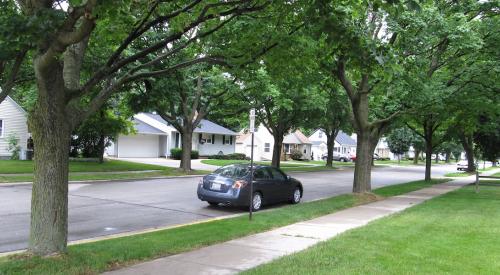Responding to the recent Oxford University and University of Hong Kong's study published in The Lancet, CityLab's Feargus O'Sullivan states there may be a strong public health case to be made for densifying the suburbs based on the results.
The health benefits of walkable neighborhoods are examined in the study's evaluation of populations and communities in the United Kingdom. The study concludes obesity rates are higher in suburban, and sparse living areas, while cities and dense housing clusters spark more physical activity and greater social support opportunities. Findings do suggest that the suburbs are not attracting people more likely to be obese than others.
While it would be mistaken to assume that observations made in the U.K. could apply everywhere, they make one thing clear: Residents’ health is highly likely to improve when sprawling suburbs are made more dense. As the graph below details, it also breaks ground by matching obesity levels with specific rates of housing density.












